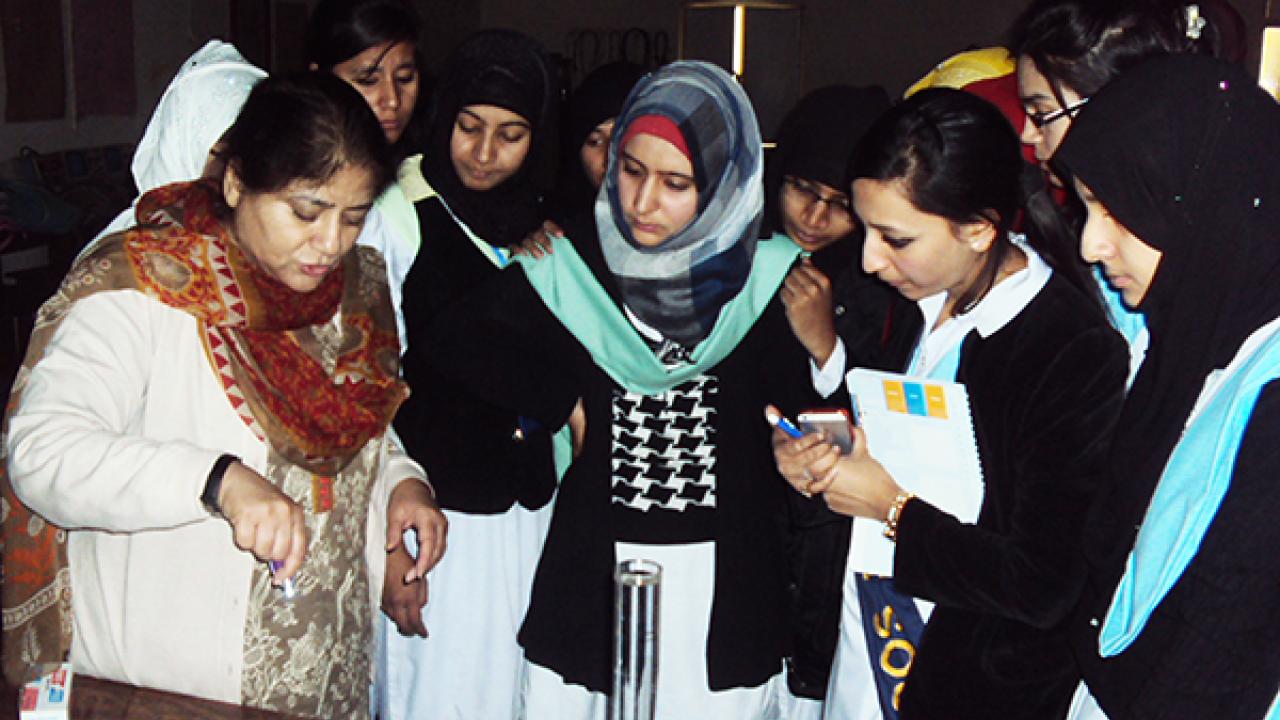
At a small, hands-on optics workshop held last summer in Pakistan, a group of young women from Quaid-i-Azam University in Islamabad could be found huddled around equipment in a laboratory. Despite the fact that their normal classes were suspended for summer recess, the women had come to the workshop anyway, overflowing with curiosity. Their hunger to learn was well nurtured by the scientist conducting the workshop, ICTP Associate Imrana Ashraf, the first Pakistani woman to earn a PhD in quantum optics.
Ashraf, an associate professor at Quaid-i-Azam University who has cooperated with ICTP for many years, is well known in the optics world not only for the quality of her research--she was one of the first women to win the ICO/ICTP Prize in optics--but also for her passion to share her knowledge with others. As a regular lecturer and tutor for ICTP’s annual Preparatory School to the Winter College on Optics and Winter College on Optics, respectively, which was held this year from 6 to 24 February, she is known to countless young researchers around the world as an enthusiastic, patient educator.
“Teaching at ICTP for the winter activity on optics is a very important part of my life and I like it,” explains Ashraf. Reflecting on her own learning experience, she adds, “There are many teachers who inspired me; I like teachers who make difficult subjects very simple for the students.”
Indeed, Ashraf’s teaching career came about thanks to ICTP. Since 1988 she has been attending the Centre’s optics colleges. Aware of the increasingly multidisciplinary backgrounds of other participants, she sensed a need for tutoring sessions to enable non-specialists to understand the often-specialized topics. She offered to help, and credits the late ICTP scientist Gallieno Denardo, who coordinated ICTP’s optics events, with having trust and faith in her ability to assist winter college attendees.
Thus began what is still an ongoing, informal learning opportunity for winter college participants that Ashraf conducts during her free time in the evenings after dinner. “It is the kind of atmosphere in which students can ask anything. When I was a student, I was not encouraged to ask questions to my teachers. And I used to feel a bit shy; maybe they would think that I am not able to understand. But when I got into this career of teaching, I made it a point to encourage every student to ask questions,” Ashraf explains.
ICTP conference participants, as well as her students at Quaid-i-Azam University, are not the only ones who benefit from Ashraf’s s zeal for teaching; since 2015, she has organized a team of volunteers to run special workshops for high school girls and young women undergraduates, giving them the opportunity to engage in inquiry-based learning involving hands-on activities. The team includes another ICO-ICTP prize winner, Jehan Akbar from Hazara University, and Ashraf’s colleague Raheel Ali. ICTP scientist Joseph Niemela, who was the global coordinator for the UN’s 2015 International Year of Light, donated optics kits for Ashraf’s workshops and visited one of the events himself to see Ashraf in action. “I can attest to Imrana’s remarkable spirit of involvement and her selfless drive to help the younger generation of Pakistani students to discover or re-discover the joy of science,” he reports.
Ashraf’s tireless efforts to spread the joy of science have not gone unnoticed: she recently became one of four recipients of the 2017 Spirit of Abdus Salam Award. Sponsored by the family of ICTP founder and Nobel Laureate Abdus Salam, the award recognizes those who, like Salam himself, have worked tirelessly to promote the development of science and technology in disadvantaged parts of the world.
“Imrana, through her efforts in teaching and promoting science not only at ICTP but in my father's and her own country, has very strongly contributed to ICTP's mission and we consider her an extremely important role model for women scientists from developing countries,” says Abdus Salam’s son Ahmad Salam, who coordinates the award on behalf of the Salam family. He adds, “Imrana has repeatedly shown her commitment to teach and educate others well beyond the call of duty. I know she has put in the hours willingly and, like my father, always practiced an open door policy for the benefit of her students. Abdus Salam would also have wholly approved of her advocacy of women in science.”
“ICTP is a really important part of my life, like a second home to me,” says Ashraf, adding, “All my relation with everybody in optics is because of ICTP. I got an opportunity here to teach, thanks to Professor Denardo. And now, thanks to Professor Niemela, ICTP’s support and trust in me to help with the optics activities continues. Anybody can do many good things, but you need opportunities.”
For Niemela, coordinator of ICTP’s optics college, Ashraf’s outreach activities have important consequences for future generations of scientists. “Perhaps another person with the greatness of the late Abdus Salam will emerge from Pakistan and it could indeed be one of the young girls inspired by Imrana’s example, demonstrating at a personal level that science is a gift that we should share for the betterment of all.”
--Mary Ann Williams
















